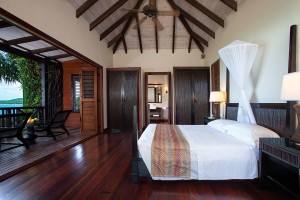 In the five-star hotel business, where gold taps and marble bathrooms dominate, many resorts aim to capture a sense of luxury that is defined by things. Since opening in 2006, Hermitage Bay in Antigua has taken a different approach. The time I spent there was eye-opening, and has forever changed how I view the luxury travel experience. Nestled on the beach and hillside amidst 140 acres of undeveloped land, the 28-suite boutique resort was founded on the principle of living with the natural environment.
In the five-star hotel business, where gold taps and marble bathrooms dominate, many resorts aim to capture a sense of luxury that is defined by things. Since opening in 2006, Hermitage Bay in Antigua has taken a different approach. The time I spent there was eye-opening, and has forever changed how I view the luxury travel experience. Nestled on the beach and hillside amidst 140 acres of undeveloped land, the 28-suite boutique resort was founded on the principle of living with the natural environment.
The resort’s inception began in 2002, when Andy Thesen traveled from his home in London with a business associate for a holiday in Barbados. At the conclusion of their trip, they visited a beach in Antigua where Thesen’s associate had been trying to raise equity to build a hotel. Enthralled by the local scenery and cultural, Thesen, who had spent 15 years in venture capital, immediately invested.
Realizing his passion, Thesen soon became completely engrossed in the development process. He explained, “The idea was that I would be an investor, take my income, and tell my friends, ‘Oh yeah I have a hotel in the Caribbean.’ But it didn’t quite turn out like that. When we built this place I was carrying sinks. I was plumber’s mate; I was whatever I needed to be. Like a mountain goat going up and down the bloody hill.”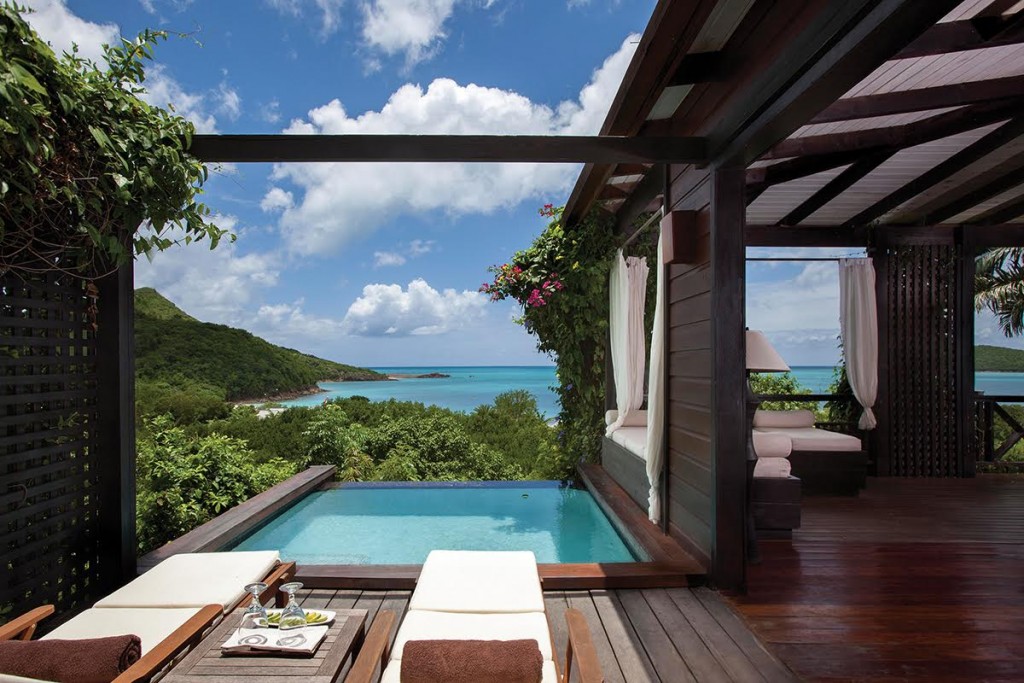
The resort would be Thesen’s first taste of entrepreneurship, and the road to opening wasn’t without its challenges. Perhaps the largest hurdle was creating Hermitage Bay’s open air design, which was constructed without an architect. “These posts were a spray can marking in the sand,” he said placing his hand on a support beam as we sat overlooking the beachfront patio. “People say it looks Asian inspired. I’ve never even been to Asia, but my theory is if you’re building in this climate, this is the obvious way to do it.”
As it turns out, Thesen was right. With humidity being so low in Antigua, the concept lends itself well to each of the resort’s three open air suite types: beachfront, garden, and hillside (which can all be partially opened to allow air to flow through). While I personally prefered the hillside suite, which includes a private plunge pool and a view of the entire bay, each of the suites have their own unique charm. Like a cabin with a tropical spin, but each is built to maximize privacy.
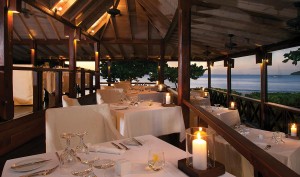 Years later, Thesen would become the resort’s sole proprietor, and many of the local staff who helped make Hermitage Bay what it is today are still there. “When I look back, there were a series of inconsequential decisions, a whole series of one’s and zero’s that had to stack up perfectly in order. Like having all the winners at the Kentucky Derby,” said Thesen describing what it was like to complete the improbable project. Although the odds were stacked against them, the folks at Hermitage Bay still rose to the occasion. And as with any project derived from passion, hard work led to the natural progression of success, and Thesen it seems, has stumbled upon his true vocation.
Years later, Thesen would become the resort’s sole proprietor, and many of the local staff who helped make Hermitage Bay what it is today are still there. “When I look back, there were a series of inconsequential decisions, a whole series of one’s and zero’s that had to stack up perfectly in order. Like having all the winners at the Kentucky Derby,” said Thesen describing what it was like to complete the improbable project. Although the odds were stacked against them, the folks at Hermitage Bay still rose to the occasion. And as with any project derived from passion, hard work led to the natural progression of success, and Thesen it seems, has stumbled upon his true vocation.
The staff has built a community; one you instantly become a part of the moment you enter the gates. General Manager Rachel Browne, who is completely immersed in the local culture, oversees a staff of around 100 who all work in unison, engaging with guests on a human basis. Browne does not script behavior for her staff. As a result of this, each of their unique personalities is free to emerge. “We’ve allowed the natural hospitality of the Caribbean to come out, for people to be themselves.” It is our human nature to take care of one another, but in the confines of everyday life, that mentality often escapes us. This nurturing state of mind allows guests to reconnect with themselves, and the essence of their own personality. “She [Browne] has created a culture here that, I believe, is what the modern luxury traveler really enjoys,” Thesen said.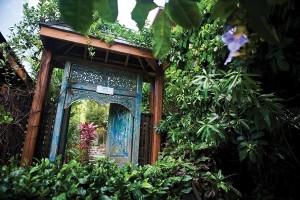
Originality extends far beyond mere hospitality. The restaurant at Hermitage Bay, which sits at the edge of the beach, offers the best of locally-sourced ingredients, with most of its fruits and vegetables being grown right in the resort’s own organic garden. The relationship between the organic garden and the kitchen is one forged from integrity and devotion to the culinary craft. Dishes are created with imagination and artistry. Aside from a few staples during lunch hours, menus for each meal are created new everyday. While Thesen has had a hand in the direction of the cuisine, he allows the natural communication between the chef and the garden to dictate each menu. Additionally, you can set up an intimate dinner on the beach for two, ideal for honeymooners or a couple on holiday. Overall, dining at Hermitage Bay is a very intimate experience.
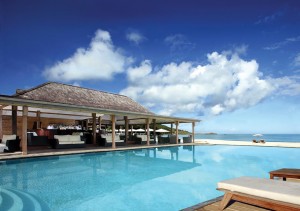 The sense of humanness is also what attracts so many celebrities and high profile individuals. “It’s incredible to watch people come in for the first time,” Thesen said, “You see an investment banker who’s so connected to the world come in and completely disconnect. Celebrities come in and slowly shed that persona, they become human and interact with people just like you and I.” You experience a different side of yourself at Hermitage Bay, one that’s at peace. And if you need any encouragement, morning meditation and yoga on the hillside is a good start. Thesen explained, “We like attracting people who feel things. Not working just from the intellect but from feeling. When you come here, we’re going to look after you.”
The sense of humanness is also what attracts so many celebrities and high profile individuals. “It’s incredible to watch people come in for the first time,” Thesen said, “You see an investment banker who’s so connected to the world come in and completely disconnect. Celebrities come in and slowly shed that persona, they become human and interact with people just like you and I.” You experience a different side of yourself at Hermitage Bay, one that’s at peace. And if you need any encouragement, morning meditation and yoga on the hillside is a good start. Thesen explained, “We like attracting people who feel things. Not working just from the intellect but from feeling. When you come here, we’re going to look after you.”
While there’s no shortage of food, spa treatments or water sports, Hermitage Bay captures a sense of luxury that diverges from the Ritz Carlton’s of the world. My stay at the resort was perhaps the closest I’ve ever felt to the earth. It’s not just the organic food or the house geckos or the stunning views — it’s the people. Their culture becomes your culture the minute you arrive. What Thesen and the locals have created is a sanctuary. Somewhere to get back to our roots, relinquish the burden of our intangible first world obsessions. A place to be human.
The post A Place to be Human: Hermitage Bay, Antigua appeared first on VUE magazine.
